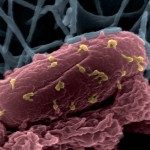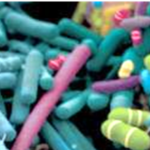Link to Pubmed [PMID] – 26971586
Environ. Microbiol. 2016 Mar;
Uropathogenic Escherichia coli (UPEC) is the leading cause of urinary tract infections (UTIs) worldwide, causing over 150 million clinical cases annually. There is currently no specific treatment addressing the asymptomatic carriage in the gut of uropathogenic Escherichia coli (UPEC) before they initiate UTIs. The present study investigates the efficacy of virulent bacteriophages to decrease carriage of gut pathogens. Three virulent bacteriophages infecting an antibiotic-resistant UPEC strain were isolated and characterized both in vitro and in vivo. A new experimental murine model of gut carriage of E. coli was elaborated and the impact of virulent bacteriophages on colonization levels and microbiota diversity was assessed. A single dose of a cocktail of the three bacteriophages led to a sharp decrease in E. coli levels throughout the gut. We also observed that microbiota diversity was much less affected by bacteriophages than by antibiotics. Therefore, virulent bacteriophages can efficiently target UPEC strains residing in the gut, with potentially profound public health and economic impacts. These results open a new area with the possibility to manipulate specifically the microbiota using virulent bacteriophages, which could have broad applications in many gut-related disorders/diseases and beyond. This article is protected by copyright. All rights reserved.





